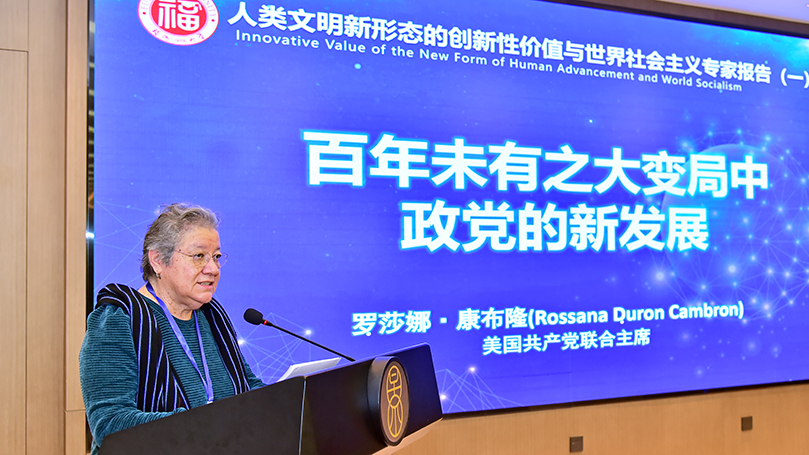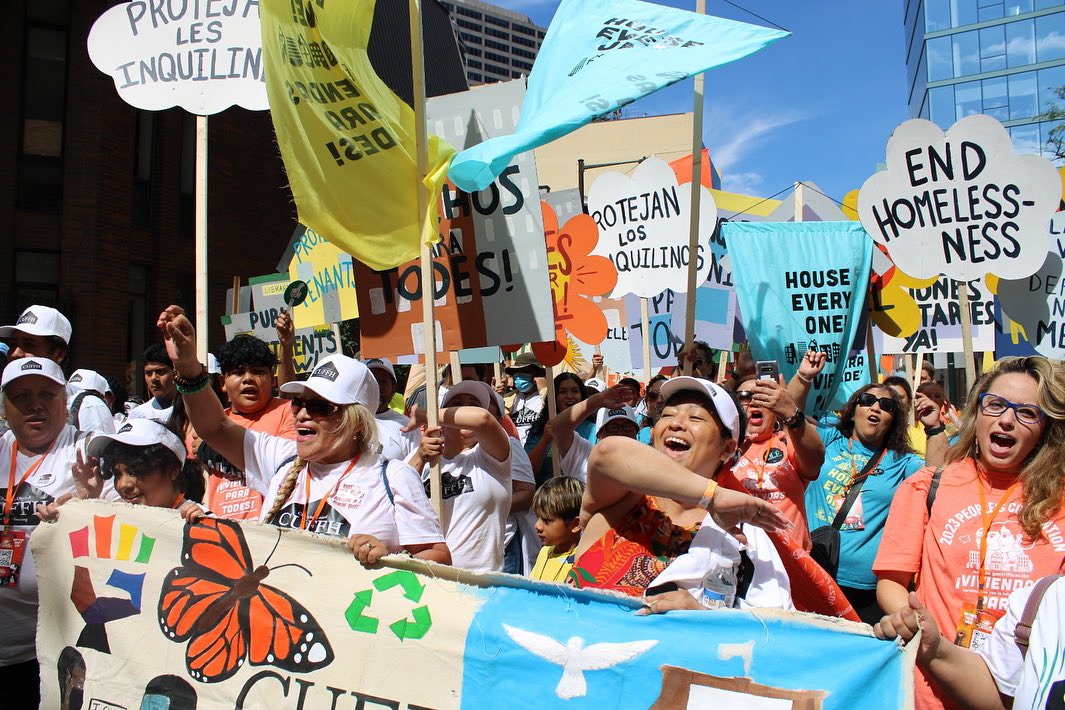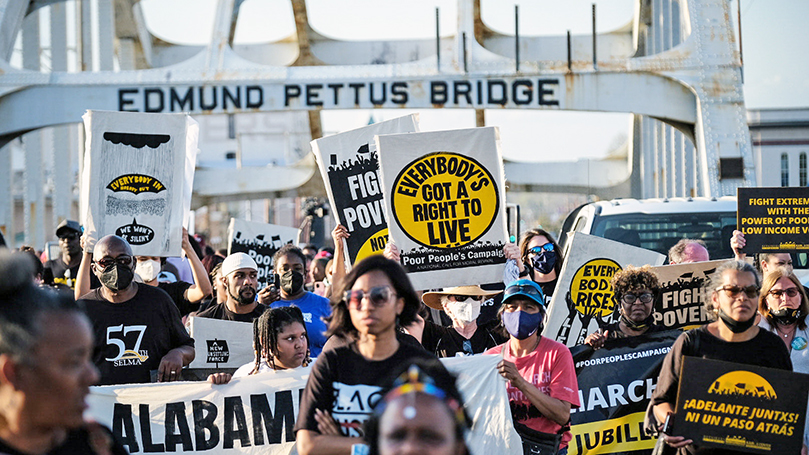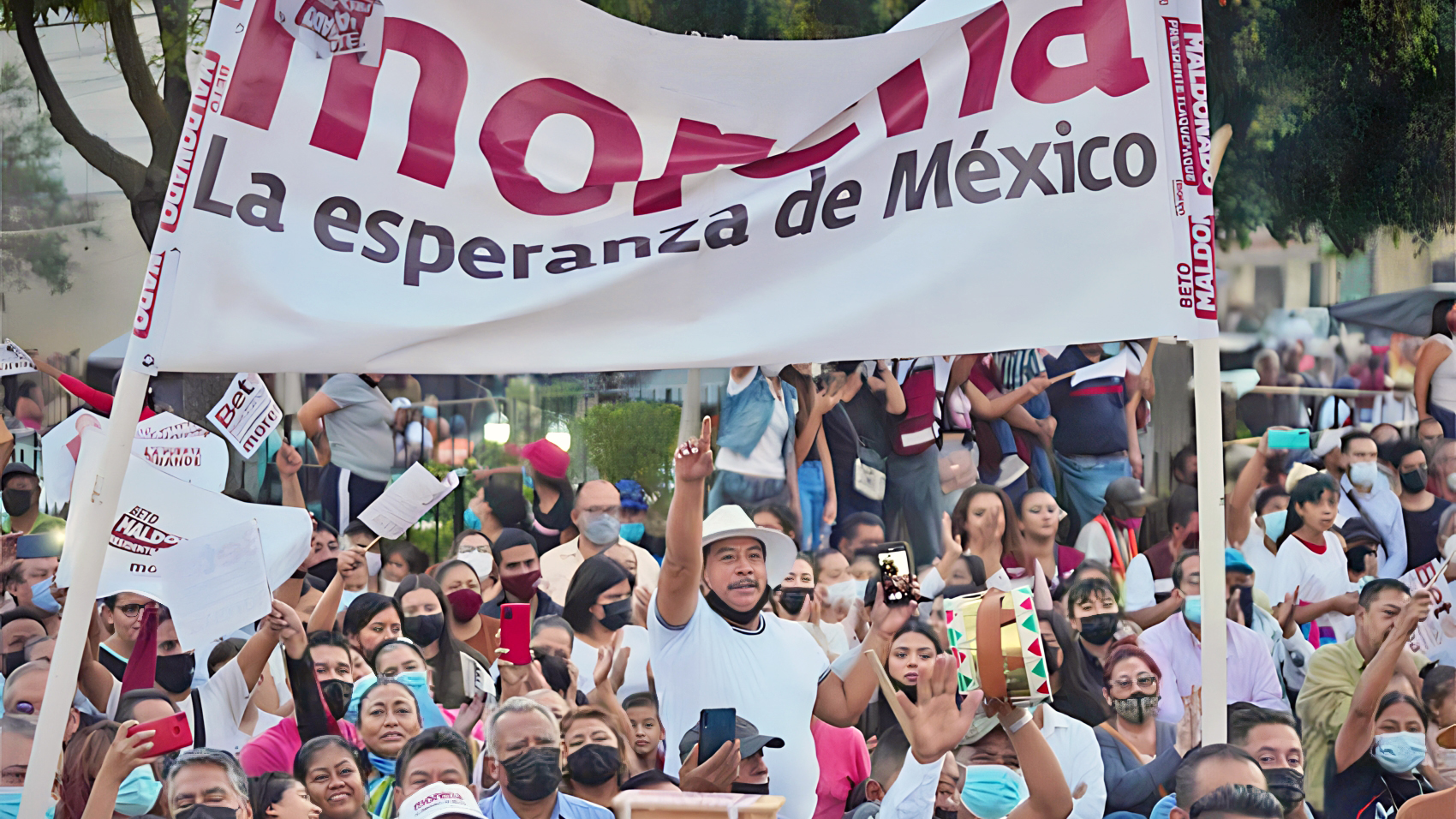
Marxism in the 21st Century continues to be relevant as events are unfolding, pointing to the decay in capitalism and the rise of a strong voice calling for a fundamental change in the system. Our task is how to apply the principles developed by Marx and Lenin, in the given, almost daily challenges of organizing strong movements that cannot be fractured by the capitalists through their ideological warfare.
The 13th World Socialism Forum took place from November 28 to December 7, 2023 with the title Building A Community with a Shared Future for Humanity and the Development of World Socialism. The forum was sponsored by the Chinese Academy of Social Sciences (CASS), the largest think tank in China, applying Marxist-Leninist principles in developing strategy and tactics to the current developments in China and around the world.
Around 80 representatives from various Communist Parties and professors of various universities were present, representing 38 countries. Many scholars from China were also present. All shared their thoughts and experiences of the conditions in their country and the overall global conditions.
Many indicated that capitalism is in decline, evidenced by its desperate moves to create conflict, whether in the form of war, or in the battle of ideas.
“Capitalism has dedicated its attention to making money through the industrial military complex and finance capital, which signifies the beginning of the ‘negation of the negation’ — there is no production, no real economy, and this leads only to decay,” said one.
“Human development is standing at the crossroads, and many questions are in front of us,” they continued. “We should not only consider the physical wars that imperialism is waging, but also, and perhaps more dangerous, is the ideological battle, because it is centered on trying to control the minds of working people.”
As a result, the world is entering a big turmoil of change and transition and all problems need a global response. Building solidarity to address these challenges was the goal of the forum. There was a call to strengthen unity among the international communist and workers’ parties, based on our common goals. Our current situation demands it.
Shared community is a guiding principle in China. They believe that we are all interconnected, following the principle that an injury to one is an injury to all. The CPC is willing to help other countries without conditions, unlike the U.S.
There was ample time for participants from the various countries to have informational discussions, building a greater understanding of each others’ struggles.
Participants were asked to prepare two presentations and were given a choice of topics to choose from.
Below are two presentations given by comrade Rossana Cambron, National Co-Chair of the CPUSA, which were well received. The first presentation was on the topic, “Building a community with a shared future for mankind and the struggle against hegemonism and power politics.”
The second presentation, given at a second conference in China on the theme of “The Innovative Value of New Forms of Human Civilization and World Socialism,” was on the topic, “The new development of political parties amid global changes of a magnitude not seen in a century.”
Presentation 1: Building a community with a shared future for mankind and the struggle against hegemonism and power politics.
Building a community with a shared future for mankind and struggling against hegemonism and power politics requires an understanding that human, scientific, and technological developments have evolved to the point where we now have the capacity to end world hunger and provide a quality education and full healthcare for everyone, end homelessness, and provide full employment with a decent wage.
In other words, we have the capacity to end world suffering, yet the only thing preventing this is capitalism, a system where resources, power, and wealth are controlled by the 1%.
There are over 8 billion people in the world, where the overwhelming majority share common goals and desires in life: to have a roof over their head, to place food on their table, to send their children to school, and to live in peace. But, once again, the desires of the many are antagonistic to the interest of the few.

For those that control the political and economic power in capitalist countries, meeting human needs is incompatible with their ability to maximize profits.
There lies the dilemma; there lies the challenge.
I want to thank the organizers of this conference for putting forward such an important topic. “How do we build a community with a shared future for mankind?” We all know that each country has its own unique conditions to take into account in addressing this.
We also know that each country has a different balance of forces that it must contend with.
Let me share our views on how we see this issue in our own country.
The United States has, for decades, strived to become the world’s dominant power. It has used its economic and military power to subjugate countries, install dictators, and overthrow democratically elected governments in an effort to open markets, take advantage of cheap labor, and appropriate natural resources — all to benefit its multinational corporations.
The U.S. is a living contradiction, where it pursues its imperialistic interests abroad, while trying to present itself as a democracy at home.
Our party is well aware that whatever changes happen in the United States will have international repercussions. We understand that our struggle to promote peace, justice, and equality, will bring about positive changes in other parts of the world.
Perhaps the greatest threat we face in our country today is the threat of fascism taking over our political institutions. The extreme right wing has existed for many decades, but it got a major boost during the Reagan administration. It went from being a marginal force to becoming the dominant force within the Republican Party.
With the election of Donald Trump in 2016, the forces that created him have unleashed vicious attacks against all workers, women, immigrants, LGBTQ people, the environment, and our democratic institutions.
Voting restrictions, gerrymandering, rigged elections, attacks on the media, and lies of stolen elections are direct attacks on our democratic process.
This fascist threat is real and all progressive forces need to take this issue head on.
Yet, we as a party, are very optimistic about our current arena of struggle. We are witnessing an upsurge among the working class that is united and committed to winning.
This includes the auto workers who stood up against the three major auto companies and won their contracts. The union leader’s strategy was to make public the incredible salaries of the CEOs compared to the workers at the plants. This brought clarity to the workers and the community of how unjust this corporate relationship was and the need to correct it.
The United Parcel Service drivers also showed their power by reaching out for community support, informing them beforehand of the working conditions they were facing. They did this in anticipation of the usual corporate media campaign that takes the side of the capitalist and misinforms the community.
Amazon and Starbucks workers also are fighting for a livable wage and to be treated with dignity and respect. Hotel workers, small business workers, actors and writers were united in their determination to win their contracts.
Today we have communities of color, women, LGBTQ people, and immigrants actively organizing and hitting the streets. We have a new generation of youth which no longer accepts the fear tactics of anti-Communism. Today, all polls show that the majority of young people under 35 believe socialism to be a better system than capitalism. This is also clearly reflected by the large number of young people that are joining our party every day.
Now let me address the question of “How do we build the struggle against hegemony and power politics.”
A few weeks ago, in November, our party organized a peace conference where this was an important component.
Members from across the country gathered to discuss our approach to building a stronger united peace movement. We discussed building peace in communities of color, in labor, among youth and women, and in the electoral arena.
We created a toolkit which highlighted legislative bills which can be fought for:
- one calling for a ceasefire in Israel and occupied Palestine,
- another cutting the Pentagon spending and reinvesting in programs that benefit working people,
- a bill calling for a prohibition on nuclear weapons, and
- a call to fully address poverty and low wages from the bottom up.

We discussed how to mobilize for their passage.
We recognize that building a stronger peace movement in our country is our responsibility and contribution to the struggle against hegemonism and power politics.
Martin Luther King Jr. once said, “Peace is not the absence of conflict, but the presence of justice.”
This has become a guiding principle for us. We understand that this is not only a political question, but an ideological one as well.
We spend over $1 trillion dollars each year on a military budget that goes mainly into the pockets of the military industrial complex. This money maintains over 800 foreign military bases, funds proxy wars in Ukraine, supports right wing regimes, and flows into de-stabilization efforts of democratic governments. Yet, they tell us there’s no money for the millions who are without healthcare or are homeless, or for the millions in our country who are living in poverty. There’s no relief for student debt, no childcare for single moms, no food programs for the hungry.
We need to develop a campaign that explains how our social needs can be met if we simply change our country’s priorities. We need to move the money away from the military and into social programs.
We need to build a campaign that can win over the various ongoing struggles in our country to the understanding that all our struggles are interrelated and interconnected. Only if we are able to redirect funds away from the military and into our communities, can our various social crises be resolved. By accomplishing this, we can defeat our country’s policies aimed at dominating the world, and help promote cooperation and mutual respect.
Our role in the international communist movement is to consider how we can coordinate our parties to build a global movement that addresses the issues that all our countries are facing, such as global warming, poverty, and the threat of war.
We look forward to a near future where the people of our country march in friendship and solidarity with all who wish to build a world community with a shared future for mankind.
Presentation 2: The new development of political parties amid global changes of a magnitude not seen in a century.
Given at the event on “The Innovative Value of New Forms of Human Civilization and World Socialism”
For many of us who are living in capitalistic countries, the new battleground for the hearts and minds of the working class is increasingly taking place in the ideological arena. We very much need to be engaged in the battle of ideas because the moral, ethical and social values that will shape future generations will be shaped by them.
We live in a time where we see world capitalism entering the decaying phase of its lifetime. As capitalism’s growing contradictions of wealth disparity and the massive accumulation of wealth by the 1% continue to grow, we see a much more aggressive ideological campaign to maintain itself in power.
As it struggles to hide its growing decomposition, new forms of nationalism, xenophobia, patriotism, religious extremism, anti-immigration and racism are being created as ideological tools meant to divide by creating distrust, fear and the blaming of others.
Although always there, the extreme-right seems to have gotten a major boost with the election of Donald Trump in 2016. This movement has scored some victories and it’s very concerning to see several right-wing parties winning in places like Italy, France, Sweden, the Congo, and most recently in Argentina.
Yet it’s also important to recognize that this ideology has been rejected in so many places, and it’s very gratifying to see social movements and left parties making dramatic gains. I would like to focus on the positive gains made by left parties in Latin America by presenting a few highlights.
In Mexico, Morena, the first left party in over 80 years, came to power with the election of Andres Manuel Lopez Obrador in 2018. They’ve had some impressive victories, including nationalizing the oil, lithium, and other natural resources.

Centering their efforts on the needs of the people, they have raised the minimum wage, doubled pensions for seniors, provided free education, and made healthcare more accessible to millions of Mexicans. Obrador’s administration has remained extremely popular and the new candidate Claudia Sheinbaum is poised next year to become the first woman president in Mexican history.
In Columbia, historically the most ardent supporter of U.S. imperialism in Latin America, the people elected the country’s first socialist president ever. Gustavo Petro, along with his running mate Francia Marquez, who became the first Black Vice President of Columbia, promised to bring about real fundamental change.
Brazil, the largest economy in Latin America, rejected the fascist government of Bolsonaro by reelecting Lula da Silva.
In fact, 2023 may have been the beginning of a new era of progressive politics as 12 of 19 countries were being run by left-wing governments earlier this year, representing 92% of the region’s population and 90% of its GDP. Even taking recent setbacks in Peru and Argentina into account, roughly 80% of the population of Latin America, and 76% of the region’s GDP is being led by left-leaning governments.
Something common that stands out in this new pink wave is that these parties are not only addressing the economic needs of their countries, they’re also presenting new social alternatives with new values and human relationships. And it’s the social movements behind them that give each their particular hue and flavor.
For example, we see that in Chile it’s the women who have taken the lead in their social movements, which is reflected in the gains made in the struggle for gender equality, childcare, and the formation of women’s collectives.
In Bolivia, a strong indigenous movement has resulted in the creation of a new constitution to guarantee rights for Mother Earth and all living things.
In Cuba, where democracy plays an important role in every facet of Cuban life, the people have recently approved a new constitution that firmly guarantees the rights of women and of the LGBTQ community with its new Family Code.
In Mexico, Bolivia, and Chile we see important gains made by Indigenous and Afro-descendent communities demanding recognition, respect and land rights.
In the U.S., our party is very conscious of working within the ideological arena of struggle. From the day we’re born, we’re pounded with what they call “American values”.
These are ideas that promote individualism and competition, of winning at all cost, ideas that say that it is your fault if you don’t succeed. These ideas are counter to who we are as social creatures.
These negative values are reflected in the U.S. having the highest rates of depression, suicide, and drug addiction.
In our party, we counter their bombardment by promoting through our projects, programs and actions, the importance of creating community, collectivity and cooperation. We understand the important role that love, friendship, and solidarity play in countering the effects of the alienation, depression, and anger that capitalism feeds off of.
This discussion of how we as Marxists see the building of a new civilization with new values and ethics is an important one. We applaud the advances made by our comrades in China in taking the lead in building a new society that’s based on a more advanced set of values and a more cooperative relationship with the rest of the world.
We are encouraged by seeing that the desire to create a more humane society is shared by so many around the world.
We look forward to the day when countries can develop relationships of friendship, respect, and solidarity that are embraced by all.
Hope is a powerful emotion and one that fuels our belief that a better tomorrow based on peace, justice, and equality is possible. But our hope is not based on idealistic, wishful thinking but rather is grounded in an understanding of an unfolding material process of social development that we can use to help guarantee a better future for all. We are confident that the new form of human civilization will be a socialist one.
I end by borrowing a wonderful slogan from our comrades in Portugal where they proudly state, “The future has a party and it’s the Communist Party.”
Let’s make that a reality, comrades.
Thank you.
Images: Rossana Cambron addresses the 13th World Socialism Forum (CPUSA); Churches United for Fair Housing (CUFFH) marches at 2023 People’s Convention hosted by The Center for Popular Democracy (CPD) in Philadelphia by CUFFH (Facebook); Poor People’s Campaign marches across Edmund Pettus Bridge by Poor People’s Campaign (Facebook); Morena party rally by Morena on Twitter (via mexiconewsdaily.com)


 Join Now
Join Now